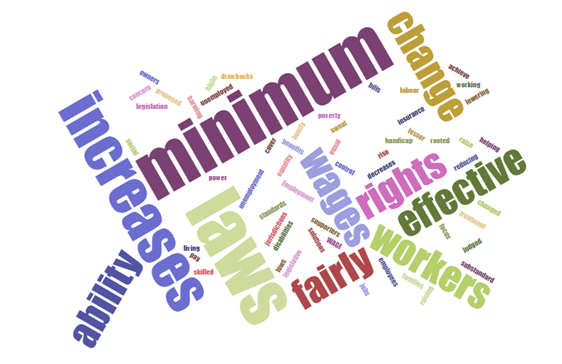Written by PJ Ferguson
President and Founder of ABL Employment / ABL Careers
On June 1, 2017, the Ontario government introduced Bill 148, the Fair Workplaces, Better Jobs Act, 2017 (Bill 148), as its response to the Final Report from the Changing Workplaces Review. There are several public hearings over the summer and then the bill would proceed through parliamentary process and with royal assent should pass the bill into law (with some minor changes given the Liberal majority) in September and October. If passed, Bill 148 would introduce a range of changes for Ontario companies.
This Bill has several profound effects on all Employers in Ontario and other targeted effects on companies that utilize contract, part time or temporary agency staffing solutions. This article focuses on key points that will have the most dramatic effect on all Ontario Employers—minimum wage, Scheduling, Vacation & Emergency Leave. Stay tuned for a further article focused on the key points for companies that utilize market responsive staffing strategies such as contract, part-time or temporary agencies.
MINIMUM WAGE:
The Not-So-Good: Minimum wage is set to take a large jump in a very compressed time frame. The current system of minimum wage increases to inflation will stay in place with minimum wage increasing from $11.40 to $11.60 on October 1st, 2017. In January 2018, the minimum wage will jump to $14.00 per hour, a $2.40 jump that will create immense difficulties for the under-siege sectors of small retailers and SME’s (small to medium enterprises). It is not just the minimum wage that is affected as employees at all wage ranges may have expectations of a bump in pay. For SME’s, business contracts and pricing models based on estimated wage rates will have to be re-examined as the major cost calculation in those models is worker wages. Of course, employer government remittances are calculated as a percentage of payroll so that portion goes up as well. Companies that work within ever tightening margins and competitive pressures have to deal with a 24% increase in costs and find a way to make it work within 7 months. A further jump to $15.00 is set for January 2019, after a provincial election, so that piece is not a certainty.
The Not-So-Bad: There was some talk in the Changing Workplaces Review about eliminating categories such as student minimum wages which would have removed any incentive for employers to invest in the training and development of young workers. Instead, the categories were kept and their minimum goes up the same percentage as the standard minimum wage. Secondly, note that this wage increase strategy will encourage marginalized workers to re-engage in the workforce. Thus, the pool of available and motivated unskilled and semi-skilled workers may very well increase (which is desperately needed). Thirdly, similar large jumps in other jurisdictions have NOT led to a correspondingly large increase in all wage levels or even in the median wage rate. Starting now with proactive management of the expectations of the rest of the workforce above minimum wage should neutralize an across-the-board raise mentality that would cripple Ontario businesses.
SCHEDULING:
The Not-So-Good: Bill 148 proposes that it is an employer’s obligation to provide 3 hours pay at the regular rate if a shift is cancelled within 48 hours of its scheduled start. Currently, the legal minimum is 3 hours at minimum wage if an employee is sent home. Also, there is a new minimum “on call” payment – 3 hours’ pay at the regular rate – if an employee is placed on call and not called into work. This applies to each day of “on call” status, but would only apply once per day.
The Not-So-Bad: This is a piece that is set to come into effect in 2019 and will probably be changed by that time depending on next summer’s election results. Also, there are already provisions for pay with too short of cancellation and many companies, including ABL, already pay this at the scheduled wage and, in fact, pay 4 hours pay to keep the employee motivated to return.
EMERGENCY DAYS/STAT DAYS/VACATION DAYS:
The Not-So-Good: Bill 148 outlines that there are 10 Emergency days that all employees have and 2 of these days are paid (the first 2 that are taken in the year). This is in affect from their first day of work. Also, this proposed legislation does deny the employer the right to require any kind of doctor’s note confirming if the reason is valid (although it can be requested) and thus does make it challenging to manage attendance.
The Not-So-Bad: There’s actually not a problem with most of this provision. Emergency days have been around for companies over 50 people and many companies, like ABL, offer these to their employees as an extra time off option, or have a “sick day” provision in place that is comparable (just put into place after 3 months typically). Stat days just have an “easier” calculation that represents little change in $ amount for full time employees but does make it possible for employees to confirm they are being paid fairly so that is good. Vacation days are extended to 3 weeks after 5 years tenure…once again, most companies already do that.
These changes are set to come into effect on January 1, 2018.
The changes to Ontario businesses are quite sweeping and if you, as a concerned business, would like your voice to be heard, dates for the summer hearings and the process involved can be found here: http://www.ontla.on.ca/committee-proceedings/committee-hearings-notices/files_html/Bill%20148%20-%20Advertising%20EN.htm
Read the 2nd article of this series that concentrates on sections of Bill 148 regarding Equal Pay, Unionization and Statutory pay rules as it relates to part time, contract and temporary employees.









